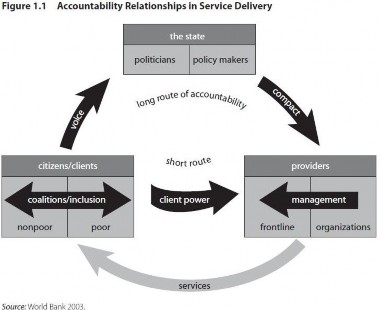Answer:
From the perspective of service delivery, governance can be understood as the set of incentives, accountability arrangements, and rules that affect the way key actors including policy makers and provider organizations and their managers and staff are held accountable for their behaviors and ability to deliver high-quality services with efficiency and responsiveness.
In many low and middle income countries, dismal failures in the quality of public service delivery are demonstrated by leakages of public funds, non delivery of goods intended for social assistance benefits. These failures have driven the agenda for better governance and accountability. Governments, civil society, and donors have become increasingly interested in the idea that citizens can contribute to improved quality of service delivery by holding policy makers and providers of services accountable.
This idea of holding accountability has been shaped by the influential 2004 World Development Report: Making Services Work for Poor People .The WDR defined a framework for analyzing accountability relationships among policy makers, providers, and citizens. Within this framework, accountability can be implemented through either a “long route,” whereby citizens influence policy makers who in turn influence service delivery through providers, or a “short route,” through which citizens individually and collectively can directly influence, participate in, and supervise service delivery by providers.

Keeping the two methods in mind following measures have been introduced for holding accountability of actors:
♤ Grievance Redress Mechanisms: Grievance redress mechanisms (GRMs) provide people with opportunities to use information to influence service delivery.
♤ Single Window System for Delivery of Services to avoid delays in delivery
♤ Public Service Delivery Guarantee Acts: in various states like Madhya Pradesh Bihar, J&K, Delhi, Rajasthan, Uttar Pradesh (to be referred as Right to Public Services Acts, RTPS Act) that guarantee time-bound delivery of selected services to the citizen. The Acts are significant as they place the onus of delivery on the service provider with penalties for delays in service provision.

These initiatives can go a long way in improving the quality of public services and fixing the accountability at individual level.
